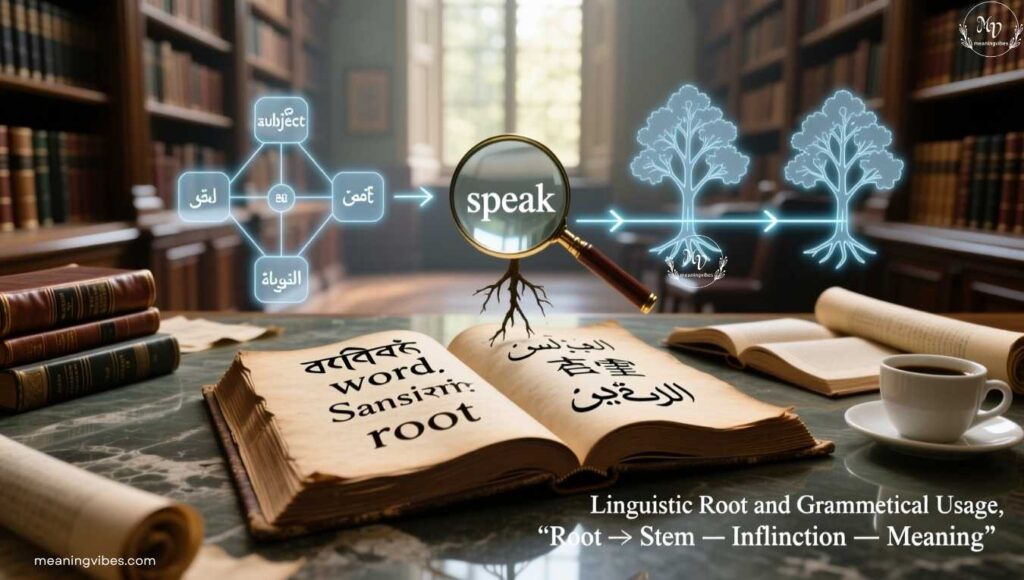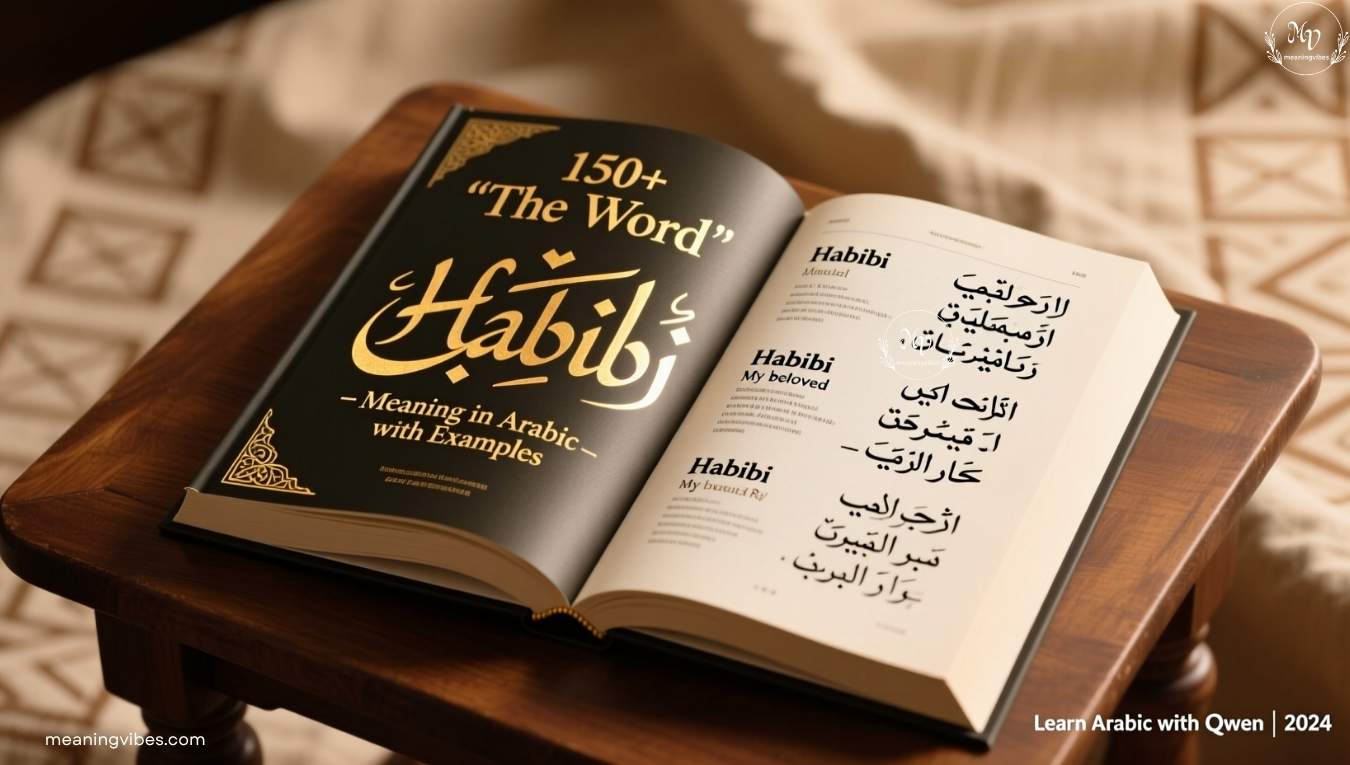Have you ever heard someone say “Habibi” in a song or movie and wondered what it really means? Maybe you’ve searched for habibi meaning, habibi meaning in English, or even al habibi meaning and felt unsure. Some people even ask about habibi in Arabic or abibi meaning, trying to figure out if they’re the same. You’re not alone,this word sparks curiosity everywhere!
In this blog, you’ll discover the real Habibi Meaning in Arabic, explained in a simple, friendly way. We’ll uncover its cultural depth, emotional tone, and how to use it naturally. By the end, you’ll fully understand why Habibi is one of the most loved words in the Arabic language.
The Meaning of “Habibi” in Arabic
The Arabic word Habibi (حبيبي) comes from the root word ḥ-b-b (ح ب ب), which means love or affection. When you add the suffix -i (ـي) to habib, it becomes “my beloved” or “my dear.” So, Habibi literally means “my love” or “my dear one.”
In English, people often use it like saying “sweetheart,” “darling,” or “dear friend.” However, its emotional tone in Arabic goes much deeper. The Arabic language is rich in emotional nuance, and Habibi in Arabic captures affection, kindness, and connection all at once.
| Arabic Word | Transliteration | English Meaning | Usage |
| حبيبي | Habibi | My love (male speaker to male/female) | General or affectionate |
| حبيبتي | Habibti | My love (to a female) | Romantic or friendly |
| حبيب | Habib | Beloved | Base form of the word |
Habibi meaning in English is therefore not limited to romance , it can express love between parents and children, close friends, or even jokingly among acquaintances.
Different Shades of Meaning
- Romantic: Between couples – “I love you, Habibi.”
- Friendly: Between friends – “Hey Habibi, how are you?”
- Casual: In Arabic pop culture or greetings – “Habibi, come here!”
You may also hear the expression “Al Habibi” (الحبيبي), which translates to “the beloved.” It’s used in poetry, songs, and sometimes in religious contexts to emphasize deep affection.
Abibi meaning is sometimes mistaken for Habibi due to pronunciation variations, but abibi itself doesn’t have a recognized meaning in Arabic.
Linguistic Root and Grammatical Usage

Arabic words often come from three-letter roots, which form families of related meanings. The word Habibi stems from the root H-B-B (ح ب ب) , connected to love (hubb) and affection.
- Hubb (حب) = love
- Yuhibbu (يحب) = he loves
- Habib (حبيب) = beloved
- Habibi (حبيبي) = my beloved
These words show how Arabic uses possessive suffixes to personalize meaning. The suffix -i (ـي) means “my.” So, when you say Habibi, you’re literally saying “my beloved.”
Masculine and Feminine Forms
Arabic is a gendered language, so words change depending on whom you’re speaking to:
- Habibi (حبيبي) – used for male (addressing a male or by a male speaker)
- Habibti (حبيبتي) – used for female (addressing a female)
| Form | Arabic | Transliteration | Meaning |
| Masculine | حبيبي | Habibi | My dear (male form) |
| Feminine | حبيبتي | Habibti | My dear (female form) |
Arabic grammar allows flexible affection , you can use Habibi warmly even outside romantic contexts. It’s one of the most endearing parts of Arabic vocabulary lessons for beginners.
Examples of “Habibi” in Arabic Sentences
Let’s look at real examples showing how Habibi fits naturally in Arabic sentences.
| Arabic Sentence | Transliteration | English Translation |
| كيف حالك يا حبيبي؟ | Kayfa halak ya Habibi? | How are you, my dear? |
| أحبك يا حبيبي. | Uhibbuka ya Habibi. | I love you, my love. |
| تعال هنا يا حبيبي. | Ta‘al huna ya Habibi. | Come here, my dear. |
| شكراً يا حبيبي. | Shukran ya Habibi. | Thank you, dear. |
| تصبح على خير يا حبيبي. | Tusbih ‘ala khayr ya Habibi. | Good night, my love. |
These sentences show Habibi in conversation used affectionately in both everyday and emotional situations.
Quick Usage Tips
- Use Habibi with friends or loved ones.
- Say Habibti when speaking to a woman.
- Avoid overusing it with strangers,it can sound too personal.
Habibi meaning in English changes slightly depending on context, so always notice tone and relationship.
Cultural or Quranic Significance of “Habibi”

In Arab culture, affection is openly expressed through words. Calling someone Habibi doesn’t always imply romance , it’s a sign of warmth, respect, and closeness.
In Arabic societies, people often greet each other with phrases like:
- “Marhaba Habibi!” (Hello my dear!)
- “Sho akhbarak Habibi?” (What’s up, my friend?)
In Islamic context, while the exact word Habibi may not appear frequently in the Qur’an, the root word H-B-B (love) is central to Islamic teachings. The Qur’an emphasizes love and mercy (rahma), especially between believers and family members.
Love in the Qur’an is described in spiritual terms , God’s love (hubb Allah) for humankind and the love between people rooted in compassion and faith.
Habibi in Poetry and Music
Arabic music and poetry are filled with the word Habibi. Artists like Amr Diab and Fairuz popularized it globally. When you hear “Habibi” in a song, it may mean:
- “My sweetheart”
- “My beloved friend”
- “The one I long for”
This word beautifully blends emotional depth with cultural richness.
Common Misunderstandings or Mistakes
Non-Arabic speakers often misunderstand Habibi meaning because of how it’s portrayed in pop culture. Here are common mistakes:
| Mistake | Explanation |
| Thinking it’s only romantic | It’s also used for friends, parents, or children |
| Mixing Habibi and Habibti | Habibi = to males, Habibti = to females |
| Saying “Al Habibi” incorrectly | Should mean “the beloved,” but rarely used in speech |
| Believing “Abibi meaning” exists | “Abibi” is not an Arabic word; likely a mishearing of Habibi |
Quick Comparison Table: Habib vs Habibi vs Habibti
| Word | Meaning | Gender | Use |
| Habib | Beloved | Neutral | General form |
| Habibi | My beloved | Masculine | To male or by male |
| Habibti | My beloved | Feminine | To female |
So next time you hear “Habibi” in a song, remember,it could mean “dear friend” just as much as “my love.”
Why You Should Learn “Habibi”
Learning Habibi in Arabic isn’t just about vocabulary. It’s about understanding Arabic emotion and expression.
Here’s why this simple word is worth learning:
- It’s one of the most used Arabic expressions of affection.
- It helps you sound more natural in Arabic conversation.
- It deepens your appreciation for Arabic culture and communication.
Learning Resources
- Take Arabic lessons for beginners to practice real dialogue.
- Try online Quran classes or courses like those at Shaykhi Academy to learn pronunciation.
- Listen to Arabic music and poetry , it’s full of examples of Habibi.
Learning Arabic online opens a window to understanding the heart behind words like Habibi and Habibti.
Frequently Asked Questions
What is the real Habibi Meaning in Arabic?
The Habibi Meaning is “my love” or “my dear,” showing deep affection and warmth.
How do you say Habibi in Arabic correctly?
To say Habibi Meaning in Arabic, pronounce it as “Ha-bee-bee,” which means “my beloved” in English.
What’s the difference between Habibi and Habibti?
The Habibi Meaning in Arabic is for males, while “Habibti” is used lovingly for females.
Is Habibi only used for romantic love?
No, the Habibi Meaning in Arabic also expresses friendship, kindness, and family affection beyond romance.
What does Al Habibi mean in Arabic culture?
Al Habibi Meaning in Arabic means “the beloved,” often used in songs, poems, and emotional expressions.
Does the Quran mention Habibi or its meaning?
While the exact Habibi Meaning in Arabic isn’t stated, the root word for love appears in Quranic verses.
Why is learning the Habibi Meaning in Arabic important?
Understanding the “Habibi” Meaning in Arabic helps connect with Arab culture, emotions, and genuine affectionate communication.
Conclusion
The Habibi Meaning in Arabic is more than just a word. It shows love, care, and connection. People use it to say my dear or my love in daily talk. The real habibi meaning is full of emotion and warmth. When you understand the habibi meaning in English, you see how one small word can express big feelings. In songs and greetings, habibi in Arabic brings a friendly and loving tone.
Learning the Habibi Meaning in Arabic helps you feel the heart of Arabic culture. It teaches how affection is spoken and shared. Even al habibi meaning adds a poetic touch, meaning the beloved. Some confuse it with abibi meaning, but that word doesn’t exist. By knowing the Habibi Meaning in Arabic, you understand not just a word, but a whole way of expressing love and respect.

I’m the creator of meaningvibes.com, sharing positivity and purpose for over 3 years. With 50+ happy clients, I help people and brands find the right words, deep meanings, and good vibes that truly connect.








